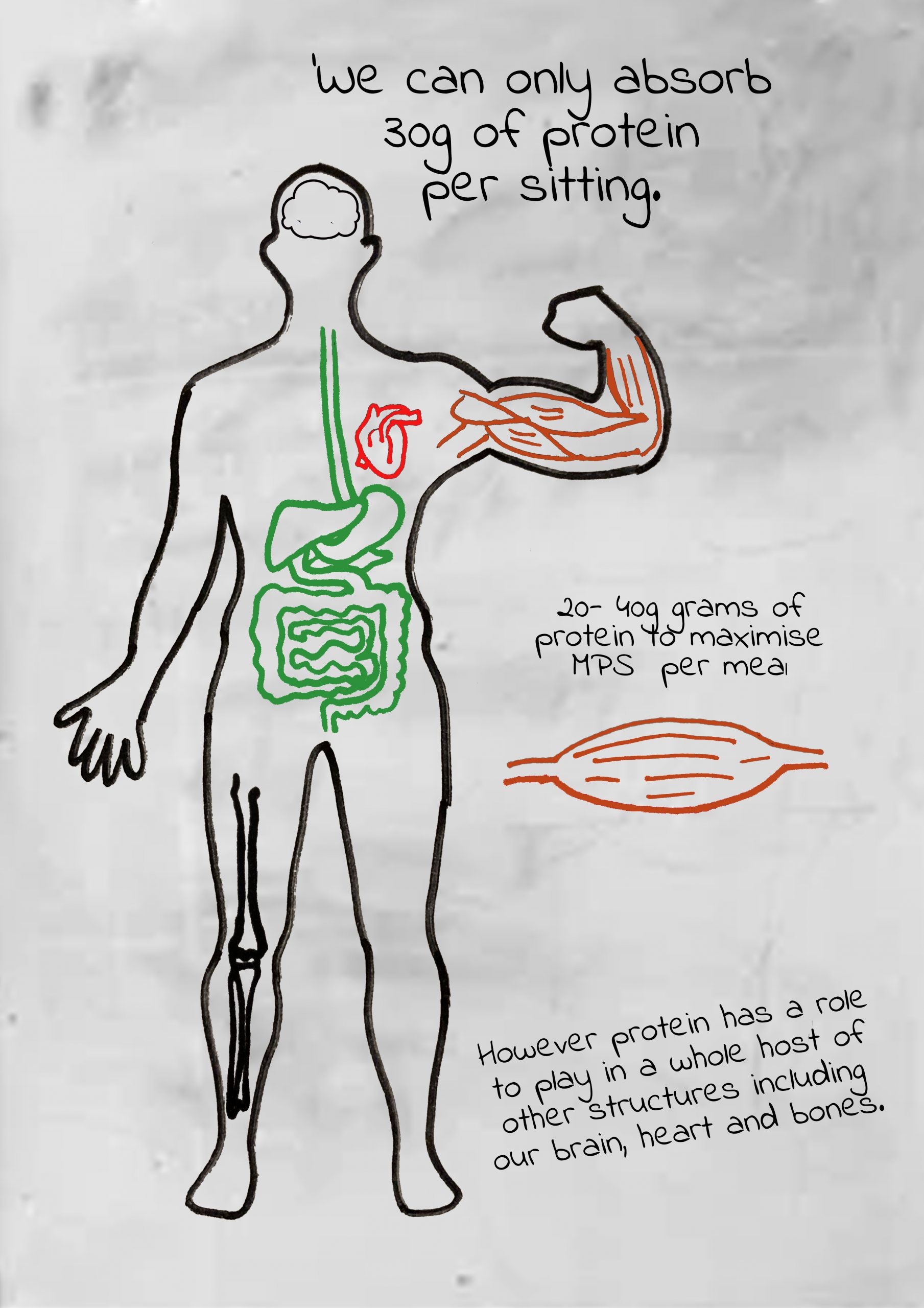How Much Protein The Body Can Absorb At Once

For years, the fitness community has buzzed with a persistent question: How much protein can the body truly absorb in a single sitting? This debate fuels supplement marketing, shapes dietary recommendations, and influences meal planning strategies for athletes and everyday individuals alike. But separating fact from fiction requires delving into the science of protein digestion and absorption.
The widely held belief that the body can only absorb a limited amount of protein, often cited as 20-30 grams per meal, has been challenged by recent research. This notion, while convenient, oversimplifies the complex processes of protein metabolism. Understanding the nuances of protein absorption is crucial for optimizing muscle growth, recovery, and overall health.
The Science of Protein Absorption
Protein digestion begins in the stomach, where hydrochloric acid and enzymes like pepsin break down proteins into smaller peptides. These peptides then move into the small intestine, where further enzymatic action by pancreatic enzymes like trypsin and chymotrypsin breaks them down into individual amino acids and smaller peptides.
It is these amino acids and small peptides that are absorbed through the intestinal wall into the bloodstream. The rate of absorption is influenced by several factors, including the type of protein, the individual's metabolic rate, and the composition of the meal.
Debunking the Myth of Limited Absorption
The idea of a strict limit on protein absorption stems from studies examining protein synthesis rates after consuming varying amounts of protein. Some studies showed that muscle protein synthesis plateaued after a certain amount of protein intake, leading to the assumption that the excess protein was wasted. However, this is not necessarily the case.
Dr. Layne Norton, a renowned expert in protein metabolism and muscle physiology, has extensively researched this topic. He and others argue that while muscle protein synthesis may plateau, the body continues to digest and absorb the remaining amino acids.
These excess amino acids are not simply excreted. They can be used for other bodily functions, such as hormone production, enzyme synthesis, and energy production through gluconeogenesis. Furthermore, studies have shown that larger protein doses can lead to prolonged elevation of amino acid levels in the blood, which can be beneficial for muscle protein synthesis over time.
Factors Influencing Protein Utilization
Several factors play a significant role in how the body utilizes protein. These include:
- Protein Source: Different protein sources have different digestion rates. Whey protein, for example, is rapidly digested, while casein protein is digested more slowly.
- Meal Composition: The presence of carbohydrates and fats in a meal can affect the rate of protein digestion and absorption.
- Individual Metabolism: Metabolic rate, activity level, and overall health status all influence protein requirements and utilization.
- Training Status: Individuals who are actively engaged in resistance training require more protein than sedentary individuals.
Dr. Stuart Phillips, a professor of kinesiology at McMaster University and a leading researcher in protein nutrition, emphasizes the importance of considering individual needs when determining protein intake. He highlights that athletes and active individuals may benefit from consuming larger protein doses than what is typically recommended.
Implications for Dietary Recommendations
The understanding that the body can absorb more protein than previously believed has significant implications for dietary recommendations. Instead of rigidly adhering to the 20-30 gram per meal rule, individuals should focus on meeting their total daily protein needs. This can be achieved through strategically timed meals and snacks throughout the day.
For athletes and individuals looking to maximize muscle growth, consuming 1.6-2.2 grams of protein per kilogram of body weight per day is generally recommended. Distributing this protein intake evenly throughout the day can help optimize muscle protein synthesis.
The International Society of Sports Nutrition (ISSN) recommends consuming protein every 3-4 hours to maximize muscle protein synthesis. This approach aligns with the understanding that the body can effectively utilize larger protein doses over time.
A Human-Interest Angle: The Bodybuilder's Dilemma
For years, bodybuilders and strength athletes have meticulously planned their meals to ensure they consumed protein every few hours. This practice was largely based on the belief that the body could only absorb a limited amount of protein at a time.
However, the evolving understanding of protein absorption has liberated many athletes from this rigid approach. They can now consume larger, less frequent meals without fear of wasting protein. This provides greater flexibility and convenience in their dietary planning.
One bodybuilder, Mark R., shared his experience: "I used to stress about eating every 2-3 hours. Now I focus on hitting my daily protein target, and I'm seeing similar results with a lot less stress about meal timing."
Conclusion
While the idea that the body can only absorb a limited amount of protein at once has been widely circulated, scientific evidence suggests that this is an oversimplification. The body is capable of digesting and absorbing significant amounts of protein, and the utilization of amino acids depends on various factors, including individual needs and meal composition.
Focusing on meeting total daily protein needs and strategically distributing protein intake throughout the day is a more effective approach than strictly adhering to the 20-30 gram per meal rule. This nuanced understanding empowers individuals to optimize their protein intake for muscle growth, recovery, and overall health.
Further research is ongoing to fully elucidate the intricacies of protein metabolism and utilization. However, current evidence supports the notion that the body is far more adaptable and efficient at processing protein than previously thought.


















